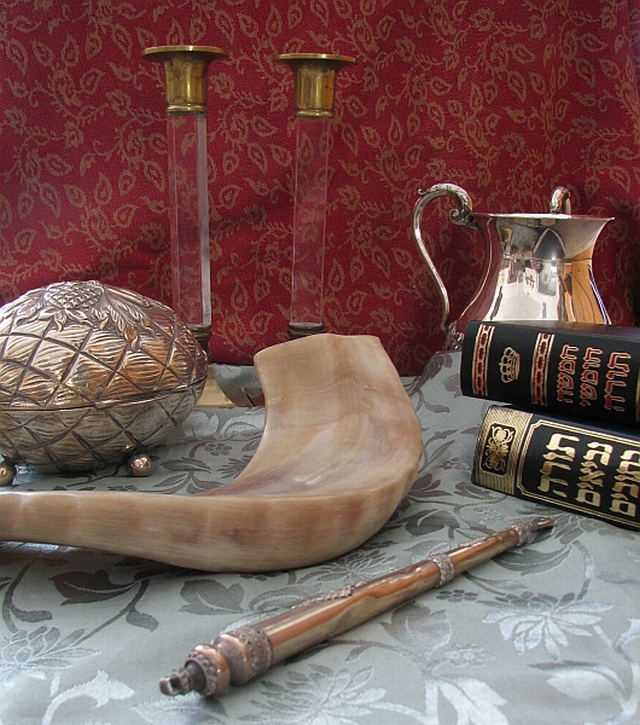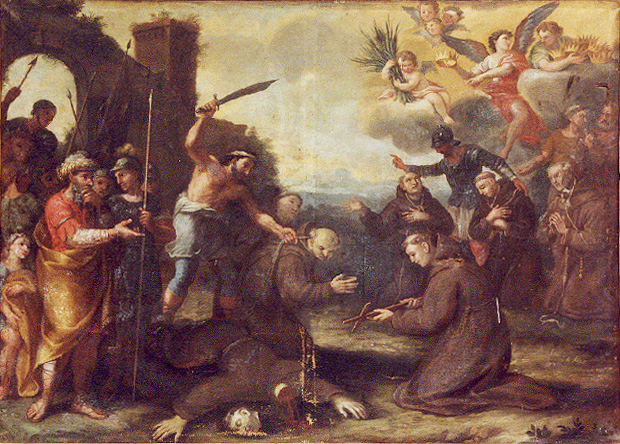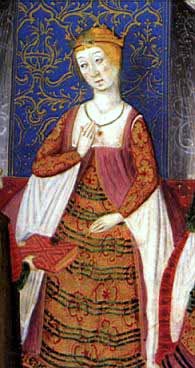|
Converso
A ''converso'' (; ; feminine form ''conversa''), "convert", () was a Jew who converted to Catholicism in Spain or Portugal, particularly during the 14th and 15th centuries, or one of his or her descendants. To safeguard the Old Christian population and make sure that the ''converso'' "New Christians" were true to their new faith, the Holy Office of the Inquisition was established in Spain in 1478. The Catholic monarchs Ferdinand and Isabella expelled the remaining openly practising Jews by the Alhambra decree of 1492, following the Christian ''Reconquista'' (reconquest) of Spain. However, even a significant proportion of these remaining practising Jews chose to join the already large ''converso'' community rather than face exile. ''Conversos'' who did not fully or genuinely embrace Catholicism, but continued to practise Judaism in secrecy, were referred to as ''judaizantes'' (" Judaizers") and pejoratively as ''marranos'' ("swine"). New Christian converts of Muslim ... [...More Info...] [...Related Items...] OR: [Wikipedia] [Google] [Baidu] |
Crypto-Judaism
Crypto-Judaism is the secret adherence to Judaism while publicly professing to be of another faith; practitioners are referred to as "crypto-Jews" (origin from Greek ''kryptos'' – , 'hidden'). The term is especially applied historically to Spanish Jews who outwardly professed Catholicism, also known as Conversos, Marranos, or the Anusim. The phenomenon is especially associated with Renaissance Spain, following the Massacre of 1391 and the expulsion of the Jews in 1492.Levine Melammed, Renee. "Women in Medieval Jewish Societies," in ''Women and Judaism: New Insights and Scholarship''. Ed. Frederick E. Greenspahn. New York: New York University Press, 2009. 105–106. Europe Officially, Jews who converted in Spain during the 14th and 15th centuries were known as ''Cristianos Nuevos'' (New Christians), but were commonly called '' conversos'' (converts o Christianity. Spain and Portugal passed legislation restricting their rights in the mother countries of Spain and Portug ... [...More Info...] [...Related Items...] OR: [Wikipedia] [Google] [Baidu] |
Marrano
Marranos were Spanish and Portuguese Jews living in the Iberian Peninsula who converted or were forced to convert to Christianity during the Middle Ages, but continued to practice Judaism in secrecy. The term specifically refers to the charge of crypto-Judaism, whereas the term ''converso'' was used for the wider population of Jewish converts to Catholicism, whether or not they secretly still practised Jewish rites. Converts from either Judaism or Islam were referred to by the broader term of " New Christians." The term ''marrano'' came into later use in 1492 with the Castilian Alhambra Decree, which prohibited the practice of Judaism in Spain and required all remaining Jews to convert or leave, under the premise that, "If they are not good Christians, their descendants will be." By then, the vast majority of Jews in Spain had converted to Catholicism, perhaps under pressure from the Massacre of 1391, and ''conversos'' numbered hundreds of thousands. They were monitored by th ... [...More Info...] [...Related Items...] OR: [Wikipedia] [Google] [Baidu] |
Morisco
Moriscos (, ; pt, mouriscos ; Spanish for "Moorish") were former Muslims and their descendants whom the Roman Catholic church and the Spanish Crown commanded to convert to Christianity or face compulsory exile after Spain outlawed the open practice of Islam by its sizeable Muslim population (termed '' mudéjar'') in the early 16th century. The Unified Portuguese and Spanish monarchs mistrusted Moriscos and feared that they would prompt new invasions from the Ottoman Empire after the Fall of Constantinople. So between 1609 and 1614 they began to expel them systematically from the various kingdoms of the united realm. The most severe expulsions occurred in the eastern Kingdom of Valencia. The exact number of Moriscos present in Spain prior to expulsion is unknown and can only be guessed on the basis of official records of the edict of expulsion. Furthermore, the overall success of the expulsion is subject to academic debate, with estimates on the proportion of those who avoi ... [...More Info...] [...Related Items...] OR: [Wikipedia] [Google] [Baidu] |
Forced Conversion
Forced conversion is the adoption of a different religion or the adoption of irreligion under duress. Someone who has been forced to convert to a different religion or irreligion may continue, covertly, to adhere to the beliefs and practices which were originally held, while outwardly behaving as a convert. Crypto-Jews, crypto-Christians, crypto-Muslims and crypto-Pagans are historical examples of the latter. Religion and power In general, anthropologists have shown that the relationship between religion and politics is complex, especially when viewed over the expanse of human history.Firth, Raymond (1981Spiritual Aroma: Religion and Politics ''American Anthropologist'', New Series, Vol. 83, No. 3, pp. 582–601 While religious leaders and the state generally have different aims, both are concerned with power and order; both use reason and emotion to motivate behavior. Throughout history, leaders of religious and political institutions have cooperated, opposed one another, an ... [...More Info...] [...Related Items...] OR: [Wikipedia] [Google] [Baidu] |
Spanish Inquisition
The Tribunal of the Holy Office of the Inquisition ( es, Tribunal del Santo Oficio de la Inquisición), commonly known as the Spanish Inquisition ( es, Inquisición española), was established in 1478 by the Catholic Monarchs of Spain, Catholic Monarchs, King of Spain, King Ferdinand II of Aragon and Queen of Spain, Queen Isabella I of Castile. It began toward the end of the Reconquista and was intended to maintain Catholic Church, Catholic orthodoxy in their kingdoms and to replace the Medieval Inquisition, which was under Pope, Papal control. It became the most substantive of the three different manifestations of the wider Inquisition, Catholic Inquisition along with the Roman Inquisition and Portuguese Inquisition. The "Spanish Inquisition" may be defined broadly as operating in Spain and in all Spanish colonies and territories, which included the Canary Islands, the Kingdom of Naples, and all Spanish possessions in North, Central, and South America. According to modern esti ... [...More Info...] [...Related Items...] OR: [Wikipedia] [Google] [Baidu] |
New Christian
New Christian ( es, Cristiano Nuevo; pt, Cristão-Novo; ca, Cristià Nou; lad, Christiano Muevo) was a socio-religious designation and legal distinction in the Spanish Empire and the Portuguese Empire. The term was used from the 15th century onwards primarily to describe the descendants of the Sephardic Jews and Moors baptised into the Catholic Church following the Alhambra Decree. The Alhambra Decree of 1492, also known as the Edict of Expulsion, was an anti-Jewish law made by the Catholic Monarchs upon the ''Reconquista'' of the Iberian Peninsula. It required Jews to convert to Catholicism or be expelled from Spain. Most of the history of the "New Christians" refers to the Jewish converts, who were generally known as ''Conversos'' (or in a more derogatory fashion Marranos) while the Muslim converts were known as ''Moriscos''. Because the conversions were achieved in part through coercion and also with the threat of expulsion, especially when it came to the Jews, the Inquisit ... [...More Info...] [...Related Items...] OR: [Wikipedia] [Google] [Baidu] |
Reconquista
The ' ( Spanish, Portuguese and Galician for "reconquest") is a historiographical construction describing the 781-year period in the history of the Iberian Peninsula between the Umayyad conquest of Hispania in 711 and the fall of the Nasrid kingdom of Granada in 1492, in which the Christian kingdoms expanded through war and conquered al-Andalus; the territories of Iberia ruled by Muslims. The beginning of the ''Reconquista'' is traditionally marked with the Battle of Covadonga (718 or 722), the first known victory by Christian military forces in Hispania since the 711 military invasion which was undertaken by combined Arab- Berber forces. The rebels who were led by Pelagius defeated a Muslim army in the mountains of northern Hispania and established the independent Christian Kingdom of Asturias. In the late 10th century, the Umayyad vizier Almanzor waged military campaigns for 30 years to subjugate the northern Christian kingdoms. His armies ravaged the nor ... [...More Info...] [...Related Items...] OR: [Wikipedia] [Google] [Baidu] |
New Christian
New Christian ( es, Cristiano Nuevo; pt, Cristão-Novo; ca, Cristià Nou; lad, Christiano Muevo) was a socio-religious designation and legal distinction in the Spanish Empire and the Portuguese Empire. The term was used from the 15th century onwards primarily to describe the descendants of the Sephardic Jews and Moors baptised into the Catholic Church following the Alhambra Decree. The Alhambra Decree of 1492, also known as the Edict of Expulsion, was an anti-Jewish law made by the Catholic Monarchs upon the ''Reconquista'' of the Iberian Peninsula. It required Jews to convert to Catholicism or be expelled from Spain. Most of the history of the "New Christians" refers to the Jewish converts, who were generally known as ''Conversos'' (or in a more derogatory fashion Marranos) while the Muslim converts were known as ''Moriscos''. Because the conversions were achieved in part through coercion and also with the threat of expulsion, especially when it came to the Jews, the Inquisit ... [...More Info...] [...Related Items...] OR: [Wikipedia] [Google] [Baidu] |
Isabella I Of Spain
Isabella I ( es, Isabel I; 22 April 1451 – 26 November 1504), also called Isabella the Catholic (Spanish: ''la Católica''), was Queen of Castile from 1474 until her death in 1504, as well as Queen consort of Aragon from 1479 until 1504 by virtue of her marriage to King Ferdinand II of Aragon. Reigning together over a dynastically unified Spain, Isabella and Ferdinand are known as the Catholic Monarchs. After a struggle to claim the throne, Isabella reorganized the governmental system, brought the crime rate to the lowest it had been in years, and unburdened the kingdom of the enormous debt her half-brother King Henry IV had left behind. Isabella's marriage to Ferdinand in 1469 created the basis of the ''de facto'' unification of Spain. Her reforms and those she made with her husband had an influence that extended well beyond the borders of their united kingdoms. Isabella I of Castile and Ferdinand II of Aragon are known for being the first monarchs to be referred to as ... [...More Info...] [...Related Items...] OR: [Wikipedia] [Google] [Baidu] |
Alhambra Decree
The Alhambra Decree (also known as the Edict of Expulsion; Spanish: ''Decreto de la Alhambra'', ''Edicto de Granada'') was an edict issued on 31 March 1492, by the joint Catholic Monarchs of Spain (Isabella I of Castile and Ferdinand II of Aragon) ordering the expulsion of practising Jews from the Crowns of Castile and Aragon and its territories and possessions by 31 July of that year. The primary purpose was to eliminate the influence of practising Jews on Spain's large formerly-Jewish '' converso'' New Christian population, to ensure the latter and their descendants did not revert to Judaism. Over half of Spain's Jews had converted as a result of the religious persecution and pogroms which occurred in 1391. Due to continuing attacks, around 50,000 more had converted by 1415. A further number of those remaining chose to convert to avoid expulsion. As a result of the Alhambra decree and persecution in the years leading up to the expulsion, of Spain's estimated 300,000 Jewish ... [...More Info...] [...Related Items...] OR: [Wikipedia] [Google] [Baidu] |
Judaizers
The Judaizers were a faction of the Jewish Christians, both of Jewish and non-Jewish origins, who regarded the Levitical laws of the Old Testament as still binding on all Christians. They tried to enforce Jewish circumcision upon the Gentile converts to early Christianity and were strenuously opposed and criticized for their behavior by the Apostle Paul, who employed many of his epistles to refute their doctrinal positions. The term is derived from the Koine Greek word Ἰουδαΐζειν (''Ioudaizein''), used once in the Greek New Testament (), when Paul the Apostle publicly challenged the Apostle Peter for compelling Gentile converts to early Christianity to "judaize". This episode is known as the incident at Antioch. Most Christians believe that much of the Old Covenant has been superseded, and many believe it has been completely abrogated and replaced by the Law of Christ. The Christian debate over Judaizing began in the lifetime of the apostles, notably at the ... [...More Info...] [...Related Items...] OR: [Wikipedia] [Google] [Baidu] |
Old Christian
Old Christian ( es, cristiano viejo, pt, cristão-velho, ca, cristià vell) was a social and law-effective category used in the Iberian Peninsula from the late 15th and early 16th century onwards, to distinguish Portuguese and Spanish people attested as having cleanliness of blood from the populations categorized as New Christian, mainly persons of partial or full Jewish or Moorish ( Muslim) descent who converted to Christianity, and their descendants. After the expulsion of the Jewish population from Spain in 1492 and Portugal in 1497, all the Jewish population in Iberia became officially Christian. The New Christians were always under suspicion of apostasy. The creation of the Spanish Inquisition in 1478 and the Portuguese Inquisition in 1536 was justified by the need to fight heresy. It was believed that many New Christians were practicing their original religion in secret and large numbers were Crypto-Jews. The term was thus introduced in order for "Old Christians" to dist ... [...More Info...] [...Related Items...] OR: [Wikipedia] [Google] [Baidu] |








